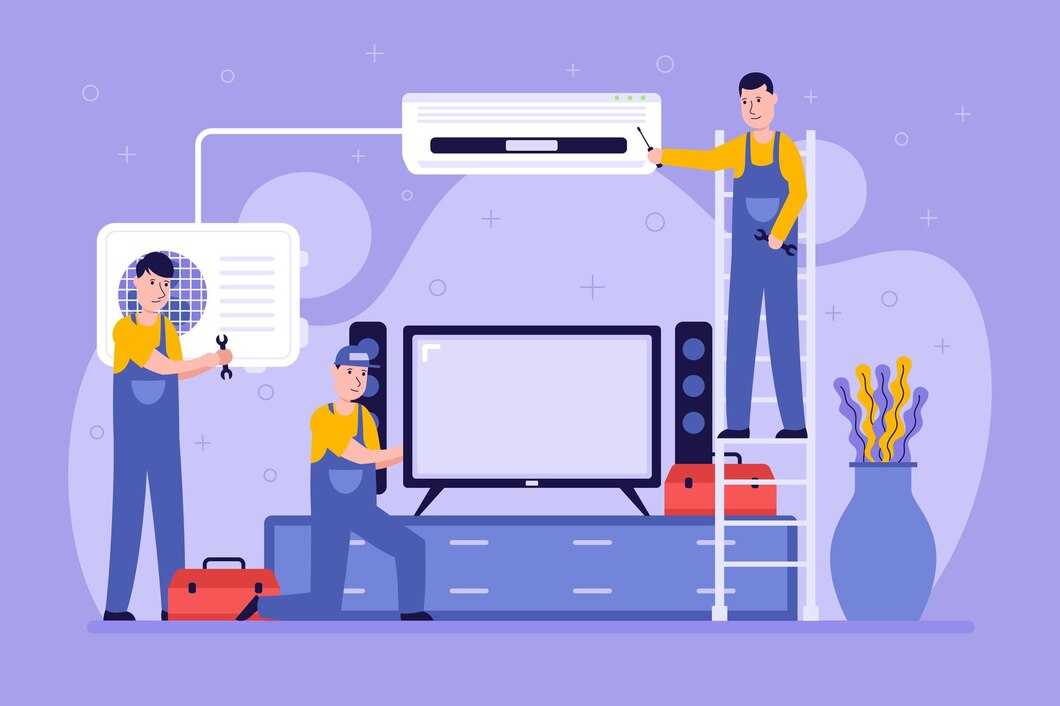Stay Cool and Comfortable with AC Repair Tips and Tricks
Maintaining your air conditioning system is crucial for home comfort, especially in summer. This guide covers how to identify AC repair needs, offers DIY troubleshooting tips, and advises when to call professionals. By the end, you’ll have the knowledge to ensure your AC runs smoothly and efficiently.
The Importance of Maintaining Your AC System
Air conditioners are a staple in most homes, providing relief from high temperatures and maintaining indoor air quality. However, like any mechanical system, they require regular maintenance to function effectively. Neglecting your AC can lead to higher energy bills, reduced performance, and even complete breakdowns. Regular upkeep not only extends the life of your unit but also ensures that it operates efficiently, saving you money in the long run.
Proper maintenance can also improve your home’s air quality. A well-functioning AC filters out dust, allergens, and pollutants, creating a healthier indoor environment. For those with allergies or respiratory issues, keeping your AC in top shape is particularly important. Beyond comfort and health, a well-maintained AC adds value to your home. Potential buyers often see a reliable HVAC system as a significant asset when considering a purchase.
Understanding the importance of AC maintenance sets the stage for recognizing signs of trouble, implementing DIY solutions, and knowing when to call in a pro. Let’s explore these aspects further to ensure your cooling system is always in peak condition.
Signs Your AC Needs Repair
Recognizing early signs of AC trouble can prevent minor issues from escalating into costly repairs. One of the most common indicators is when the unit blows warm air. If this happens, check if the thermostat is set correctly and if the air filter needs replacement. Warm air can also point to compressor issues or refrigerant leaks which require professional attention.
Another sign your AC may need repair is reduced airflow. If you notice weak or inconsistent airflow coming from your vents, it could be due to a blockage or a failing compressor. This issue can lead to uneven cooling throughout your home, making some areas uncomfortably warm while others remain cool.
Unusual noises or odors are also indicators that your AC needs attention. Grinding, squealing, or rattling sounds can signal mechanical problems, while strange odors might suggest mold or burnt-out wiring inside the unit. Addressing these issues promptly can prevent further damage and improve your system’s efficiency.
DIY Troubleshooting
Before calling in the experts, there are several DIY troubleshooting steps homeowners can take. Start by checking your thermostat settings. Ensure it’s set to “cool” and the temperature is lower than your current room temperature. Sometimes, simple adjustments resolve the problem without the need for repairs.
Next, inspect the air filter. A clogged filter restricts airflow and reduces your system’s efficiency, causing it to work harder than necessary. Replace or clean the filter at least once a month during peak usage periods to maintain optimal performance.
Finally, examine the outdoor unit. Clear away any debris, such as leaves or grass, that may obstruct airflow. Make sure there’s at least two feet of clearance around the unit for proper ventilation. These simple steps can help resolve minor issues and keep your AC running efficiently.
When to Call a Professional
While DIY fixes can resolve some issues, certain problems require professional intervention. If your AC is leaking refrigerant or producing a hissing sound, these are signs of a leak that needs immediate attention. Refrigerant leaks not only affect your system’s performance but also pose environmental hazards.
Experiencing frequent cycles of turning on and off, known as “short cycling,” is another issue best left to professionals. Short cycling can result from electrical problems or an oversized unit, both of which need expert diagnosis and repair. Additionally, if you’ve tried basic troubleshooting without success, it’s time to contact an HVAC technician.
Calling a professional is crucial when the repair involves the electrical components of your AC. Attempting to fix electrical issues yourself can be dangerous and may void your warranty. A qualified technician has the expertise and tools necessary to safely address these problems and ensure your system is functioning correctly.
Common AC Repairs
Understanding common AC repair issues can help you communicate effectively with your technician and ensure timely resolution. One frequent problem is a faulty compressor, which is essential for circulating refrigerant and cooling your home. Compressor repair or replacement should always be handled by a professional due to its complexity.
Another common issue is a malfunctioning fan. The fan’s role is to distribute cool air throughout your home and expel heat from the system. A broken fan can lead to overheating and further damage, so addressing this promptly is crucial.
Refrigerant leaks, as mentioned earlier, are also commonplace. Low refrigerant levels reduce your system’s efficiency and can lead to freezing coils. Technicians will locate and repair leaks, then recharge your system to the appropriate levels for optimal performance.
Preventative Maintenance
Implementing preventative maintenance can extend the life of your AC system and reduce the likelihood of major repairs. Schedule annual inspections with a qualified technician to check your system’s components, clean coils, and ensure everything is functioning properly.
In addition to professional maintenance, like HVAC maintenance services available in Herriman, homeowners can take proactive steps to care for their AC. Regularly replace or clean filters, clear debris from the outdoor unit, and monitor your system’s performance for any unusual changes. These tasks can prevent wear and tear and keep your system running smoothly.
Investing in a programmable thermostat is another effective preventative measure. By automating temperature settings, you can reduce strain on your AC and save energy, contributing to a longer lifespan for your unit.
Conclusion
Now that you have a better understanding of common AC problems and solutions, you can take proactive steps to ensure your system is running efficiently. Remember to address minor issues promptly, consult a professional for more complex repairs, and implement preventative maintenance to extend the life of your AC.
Keep an eye for more news & updates on GlamourTomorrow!






